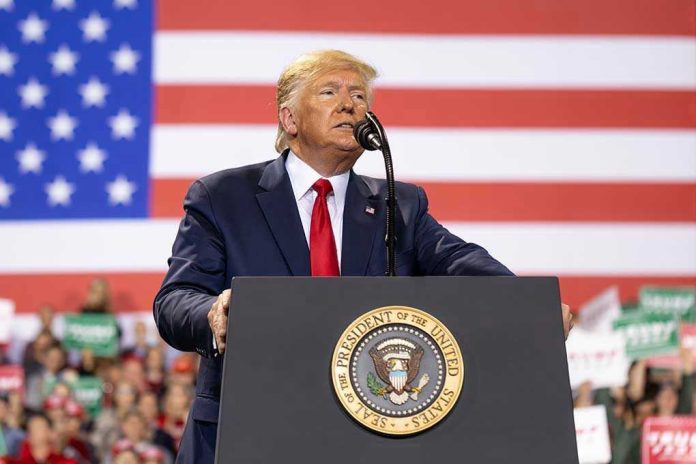
Marjorie Taylor Greene’s unprecedented public accusation against President Trump for “egging on” death threats exposes the deepening fractures within the MAGA movement and raises serious questions about the state of conservative leadership in America.
Story Snapshot
- Greene accuses President Trump of inciting threats against her after he withdraws support and attacks her online.
- The rift marks a dramatic public split between two of the MAGA movement’s most recognizable figures.
- Greene reports a surge in death threats and has increased her security, citing real-world dangers of political rhetoric.
- The feud underscores the risks of divisive language and the growing polarization within the Republican Party.
MTG’s Accusations Ignite MAGA Civil War
On November 14, 2025, President Trump announced the withdrawal of his support for Marjorie Taylor Greene, calling her a “RINO” and a “disgrace” to the Republican Party. The following day, Greene responded with a lengthy statement on X (formerly Twitter), directly accusing Trump of inciting a wave of death threats against her.
Greene, once a staunch MAGA ally, alleged that Trump’s public attacks and rhetoric had radicalized individuals, referencing past incidents in which similar language led to criminal convictions for threats on her life.
Within hours of Trump’s denunciation, Greene reported a flood of threatening communications and warnings from private security professionals, forcing her to increase personal protection measures.
The nation watched as two high-profile conservatives—once united by the America First agenda—publicly clashed in a manner rarely seen in modern party politics.
The feud’s intensity reflects not only personal animosity but also a broader reckoning for the MAGA movement, which had relied on unity and loyalty to fuel its resurgence. Greene’s accusations are unprecedented in their directness against Trump, a leader whose endorsement remains the gold standard for conservative candidates.
Her willingness to challenge Trump’s authority signals an escalating internal power struggle, with both figures vying for control over the movement’s future direction. For many conservatives, this very public split is more than political theater—it’s a warning sign of the dangers posed by unchecked rhetoric and personal vendettas at the highest levels of leadership.
Greene’s claims that paid trolls and radicalized online actors are targeting her further highlight the real-world consequences of inflammatory language in today’s hyper-connected environment.
A Fractured Alliance and the Roots of Division
Greene’s break with Trump did not happen overnight. Their alliance, once forged on shared commitment to border security, constitutional rights, and opposition to leftist overreach, began to erode as Greene publicly criticized Trump’s foreign policy decisions and economic strategies.
A major flashpoint came when Greene pushed for full transparency on the Jeffrey Epstein files, asserting that the issue had also “engulfed” Trump. Further disagreements emerged during the recent federal government shutdown, where Greene’s positions diverged sharply from Trump’s preferred tactics.
These growing policy rifts and Greene’s increasingly independent stance set the stage for a showdown that would spill out into the open, exposing deep vulnerabilities in what was once a united front. Their adversarial relationship now leaves Republican voters questioning the movement’s cohesion and the values it will prioritize going forward.
Amid this turmoil, Greene has repeatedly referenced prior convictions of men who threatened her life after being radicalized by similar online rhetoric. Her warnings are not mere hypotheticals; they are rooted in documented history.
Escalating Threats and Party Fallout
Since the public rupture, Greene has reported ongoing threats and taken extraordinary security precautions, signaling the seriousness of the situation. Private security firms, recognizing the heightened risk, have issued warnings and stepped up their protective measures.
The Republican Party’s leadership has been thrust into an uncomfortable position, forced to navigate the fallout of an intra-party feud that dominates media coverage and sows anxiety among rank-and-file members.
Trump, meanwhile, has doubled down, labeling Greene “wacky,” “lunatic,” and accusing her of drifting left—a charge that resonates with voters who remain wary of any perceived capitulation to progressive agendas.
The feud remains unresolved, with both sides refusing to back down. This standoff not only deepens divisions within the conservative base but also has the potential to realign the movement’s power structure and reframe the debate around core principles of loyalty, leadership, and accountability.
Political analysts and security experts warn that the Greene–Trump conflict is symptomatic of a broader fragmentation within the American right. Some commentators praise Greene’s courage in standing up for transparency and party reform, while others point to Trump’s history of reconciling with former adversaries as evidence that the feud may ultimately be temporary.
Regardless, the immediate impact includes increased security costs for public officials, amplified toxic behavior online, and the risk of further eroding public trust in conservative leadership. The story also prompts a renewed focus on the responsibilities that come with influence in the digital age and the urgent need to protect those who serve the people, regardless of political differences.
Sources:
Marjorie Taylor Greene says she received threats after criticism by Trump
MTG Compares Herself to ‘Epstein Cabal’ Victim After Trump Attacks
Marjorie Taylor Greene reports death threats after Trump’s astonishing ‘traitor’ attacks











